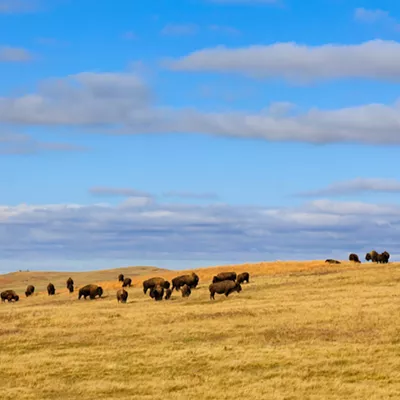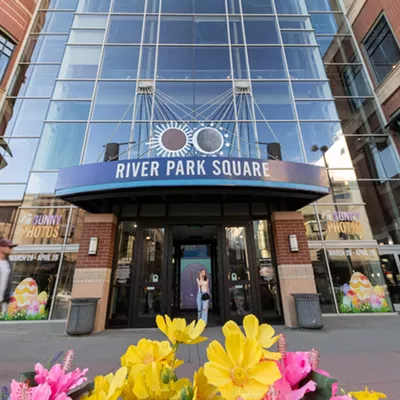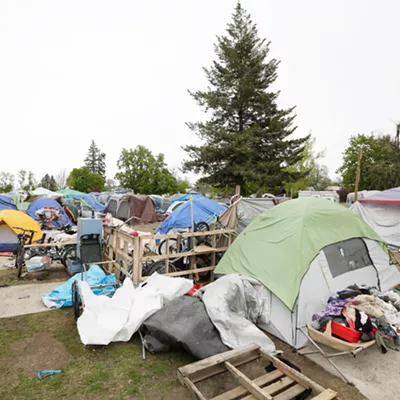
Last Wednesday, drivers stopping at Towns Liquor Mart in North Spokane were greeted with an unusual sight: cheap gas.
For two hours, gas was priced at the national average of $3.39 a gallon — a 40-cent drop from the station's normal price that day of $3.79.
The difference was paid for by a conservative political group called Let's Go Washington to promote its November ballot initiative to overturn the state's Climate Commitment Act. Passed by the Washington State Legislature in 2021, the act created a cap-and-invest program that limits greenhouse gas emissions and requires major polluters to bid for carbon emission allowances at auctions that started last year.
Initiative 2117 would repeal the program — and bar state agencies from ever enforcing cap-and-trade style carbon taxes.
The battle over Washington's flagship environmental policy is one of this year's most expensive and contentious. If successful, I-2117 would be a major blow to Gov. Jay Inslee's environmental legacy and Democrats' efforts to fight climate change.
Many of the Republican candidates for statewide and local office were at the Spokane gas station on Aug. 21 to promote the initiative. As drivers filled their tanks, the candidates gathered contact info and distributed flyers. Their message to potential voters was simple: If you want to pay less for gas, vote yes.
"You and I as consumers are paying more to benefit no one, and it's infuriating," said Pete Serrano, the Republican running for state attorney general. "Inslee indicated this would be 'pennies at the pump,' and we certainly aren't seeing [that]."
Dale Whitaker, the Republican candidate for secretary of state, described the cap-and-invest system as "aggressive legislation" that imposes "the cost burden onto the taxpayer."
The extent to which the Climate Commitment Act's carbon auctions caused oil companies to pass costs to consumers is disputed. Various organizations have estimated the impact to be anywhere from 10 to 50 cents per gallon, but oil markets are complicated and fluctuate for a variety of reasons, including conflicts like the war in Ukraine. Washington's gas prices have long been higher than the national average — they hit a record high of $5.55 in June 2022, eight months before the first auction. The statewide average was $4.18 earlier this week, according to AAA.
Outgoing state Sen. Andy Billig, a Democrat from Spokane who has been a key supporter of the Climate Commitment Act, says it's possible people are "paying a little bit more" for gas because of the law. But the cost is intended to help "address the impacts of the product that they're buying.
"It just would be an incredible mistake for Washington to shirk its responsibility to address" climate change, Billig says.
As she filled her gas tank, Spokane resident Tiffany Williams said climate change is important, but that the answer isn't to "jack up prices and make it hard on everyone."
Williams said she needs to do more research, but is considering voting for the initiative because prices are getting ridiculous.
Initiative 2117 is the product of Let's Go Washington founder Brian Heywood, a wealthy hedge fund manager.
Heywood isn't running for office, but he's arguably the most influential figure in this year's election — picture the Larry Stone of state politics.
Earlier this year, Heywood spent $6 million to single-handedly bankroll six initiatives, three of which the Legislature signed into law this spring. The other three, including I-2117, will appear on the Nov. 5 ballot. The other two initiatives propose repealing Washington's capital gains tax and allowing people to opt out of the state's long-term care insurance program.
"We're just trying to raise awareness," Heywood told the Inlander last week, watching as drivers filled their tanks with gas his organization helped pay for. "Usually there's like 300 or 400 cars that come through."
Let's Go Washington has held four similar events at other gas stations. Heywood hopes to do "as many as we can" before the election.
Earlier this summer, Inslee announced a program to give low- and moderate-income households a $200 credit to help with electric bills using money from the Climate Commitment Act auctions. Heywood accused the governor of trying to "bribe" people to vote down I-2117.
"How convenient you're doing this right before the election," Heywood said.
Heywood pushed back when asked if some might also consider paying for voters' gas to be a form of bribery.
"The big difference is this: This is money I've raised," he said. "I'm giving some of our money to help compensate them for what the state took from them."
Let's Go Washington is paying for "awareness," not votes, Heywood argued.
"It's not like I'm sitting here going, 'Oh, I won't give you this unless I see your ballot,'" Heywood said.
Billig and other opponents of the repeal effort argue that the initiative doesn't actually guarantee lower gas prices.
"It's misleading to make that promise to the people of Washington," says Mark Prentice, communications director for No On 2117, a coalition of more than 400 organizations opposed to the initiative.
The only guarantee, Prentice says, is "more traffic and more pollution."
The state's carbon auctions have raised more than $2 billion for climate-related investments. If repealed, hundreds of projects involving clean air, wildfire mitigation, transportation and clean water would be in jeopardy, Prentice says.
Spokane County has received $120 million in authorized and planned investments from the program — $78 million of which is at "high risk" of being cut if the law is repealed, according to analysis from the Clean & Prosperous Institute, a subsidiary of the Washington Business Alliance that is tracking projects funded by the Climate Commitment Act.
The list of Spokane projects at "high risk" includes the Division Street bus rapid transit line; emission reductions for the Spokane Public Facilities District; Pacific Avenue greenway pedestrian upgrades; and building efficiency and ventilation improvements for the Great Northern School District and Eastern Washington University.
Because revenue from the carbon auctions now accounts for about 30% of the state's transportation budget, Billig says the North Spokane Corridor freeway would "likely have its funding cut or limited" if the initiative passes.
State Rep. Jenny Graham, a Republican from Spokane County, isn't worried about the loss of revenue. She describes the money as going to a "black hole in the sky in Olympia" and says her constituents "need this 40 cents a gallon to put food on their table."
Some drivers went to the gas station last week because of texts that Let's Go Washington sent out in the days before the event. Others, like Kristen Mouton, just happened to be there at the right time.
"I just came to get gas," Mouton said, gesturing in confusion at the Republican political operatives darting around with clipboards. "I mean yeah, cheaper gas programs, absolutely. But I don't know what's going on."
Someone gave her a card with some basic information about the initiative. Mouton said she doesn't usually vote, but will consider doing so this year to support it.
Heywood said he supports taking some sort of action to protect the environment.
"I don't know the perfect way to do it, I don't think anybody does," Heywood said.
If it passes, Heywood said the initiative will have a ripple effect in other states with carbon credit systems.
The prospect worries Billig. If every state says it isn't their problem, climate change will spiral out of control, he says.
"And then we're all going to pay the price," Billig says. ♦
























